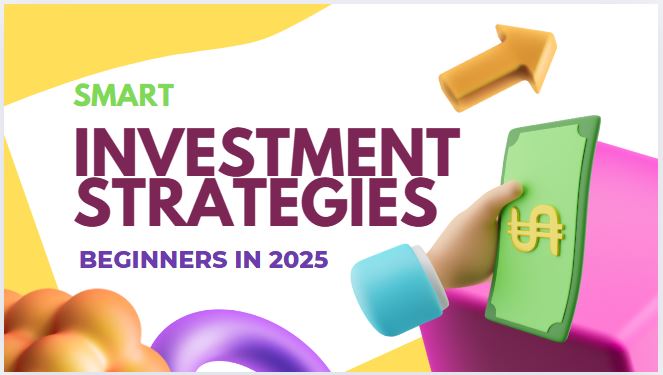Discover the top 5 beginner-friendly investment strategies in 2025 to grow your wealth safely and steadily. Start investing smart today.

Top 5 Investment Strategies for Beginners in 2025
Investing can seem intimidating—especially if you’re just starting out in 2025. With headlines about inflation, volatile markets, and economic shifts, many beginners feel overwhelmed. But the truth is, the sooner you start investing, the faster you can build long-term wealth.
The good news? You don’t need to be a finance expert to begin. Here are the top five beginner-friendly strategies that can help you grow your money while minimizing risk.
1. Start with Index Fund Investing
What it is:
An index fund is a type of mutual fund or ETF (exchange-traded fund) that tracks a market index, such as the S&P 500.
Why it’s great for beginners:
- Diversification: Spreads risk across many companies.
- Low fees: Cost-effective compared to actively managed funds.
- Consistent returns: Historically, index funds have delivered solid long-term gains.
Example: Investing in an S&P 500 index fund means you’re investing in 500 of the largest U.S. companies—automatically.
2. Dollar-Cost Averaging (DCA)
What it is:
DCA involves investing a fixed amount of money at regular intervals—regardless of market conditions.
Why it’s great for beginners:
- Helps reduce the impact of market volatility.
- Removes the emotional decision of timing the market.
- Builds discipline and consistency.
Example: Invest $100 every month into your investment account. When prices are high, you buy less. When prices are low, you buy more. Over time, this averages out your cost.
3. Invest in ETFs (Exchange-Traded Funds)
What it is:
ETFs are like index funds but trade like stocks. They can track sectors, commodities, bonds, or indices.
Why it’s great for beginners:
- Liquidity: You can buy/sell ETFs during market hours.
- Low expense ratios
- Broad exposure: Invest in tech, healthcare, or clean energy—all in one ETF.
2025 Tip: Look into sector ETFs related to AI, clean energy, and cybersecurity—industries expected to grow.
4. Consider Dividend Stocks
What it is:
These are shares in companies that pay out part of their earnings to shareholders regularly.
Why it’s great for beginners:
- Passive income: You earn money without selling your stock.
- Stability: Dividend-paying companies tend to be more established and less volatile.
Bonus Tip: Reinvest your dividends to compound your earnings even faster.
5. Use Robo-Advisors
What it is:
Robo-advisors are automated platforms that manage your investments based on your goals and risk tolerance.
Why it’s great for beginners:
- Hands-off investing
- Low fees
- Smart algorithms rebalance your portfolio automatically.
Popular Options in 2025: Wealthfront, Betterment, and SoFi Invest. Most of these platforms require no prior investment experience.
Essential Investment Tips for Beginners in 2025
- Start Small: You can begin with as little as $100. Don’t wait for the “perfect” time.
- Have a Goal: Whether it’s retirement, buying a home, or travel, knowing your goal helps guide your investment choices.
- Avoid FOMO: Don’t chase “hot” stocks or crypto trends without research.
- Think Long-Term: Wealth grows over years, not days.
- Keep Learning: Follow reliable finance blogs, YouTube channels, and books.
Common Mistakes to Avoid
- Investing money you can’t afford to lose.
- Trying to “time” the market.
- Ignoring fees and tax implications.
- Putting all your money into one investment.
- Letting emotions dictate your decisions.
Final Thoughts
Investing in 2025 is more accessible than ever before. With apps, automation, and a wealth of resources, anyone can start—even with limited capital or experience.
Focus on simplicity, consistency, and education. The earlier you begin, the more your money can grow through the power of compounding.
Start today. Your future self will thank you.
